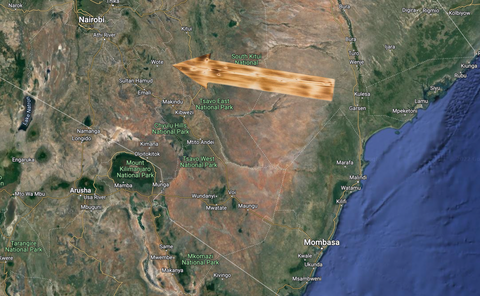Journey of a SAWA Shirt
Picked by cotton farmers in North Eastern Kenya in Lamu County, Tosheka textiles (run by Lucy Lau-Bigham) purchase the cotton at a fair price as decided together. This is on the back of Lucy's years of work campaigning for the rights of cotton farmers. This is something she is very passionate about, 'We ensure we pay a good price for the cotton because historically the cartels in Kenya have abused these people to produce low cost clothing. With us, they are treated fairly and given a good price for the cotton'. We ensured Tosheka work with farmers of rain-fed cotton who do not use pesticides or other harmful chemicals. This ensures the water 'consumption' that is often associated with cotton growth is minimal. Once water is used to grow the fibre, it recycles through the water cycle i.e. it is not 'consumed' at this stage.

Classically, a great water consumption step is when 'plain white garments' are bleached. This is when water is properly consumed as it is turned into a chemical composition that requires treatment otherwise it is actively harmful to ecosystems. So, perhaps we shouldn't be calling white garments 'plain' as they have to be actively made white. The Sawa shirt is the colour as cotton intended.
Origin are immediately involved at this stage as it is the first choices and who to work with that impact the environmental footprint of the garment you put on.
Next, the Tosheka team in Wote, spin and loom the cotton into beautiful fabric.

It is at this stage that the Origin team begin to have a say in the creative aspects of the shirt design. The cotton weave that Tosheka produce is truly beautiful so we actually found that letting Mrs Lau Bigham take the lead here was very sensible. For our shirts, we needed 3km of natural cotton, undyed fabric.

Read more about Lucy Lau Bigham in our blog post dedicated to her. She is an inspirational female leader and a brand soulmate that we are so happy to work with.

Next, the fabric is taken to the SOKO Kenya factory in Kikambala, north of Mombasa. When the SOKO business had to move to the coast for space reasons, they had 140 local employees. When they moved, all 140 employees moved with them. The management team did an extensive survey into the local living wage then decided to adjust payment to the new region as well as pay the employees extra.
Chichi Carolyne, head of HR explains, 'SOKO pays above the living wage, and not just above the living wage. I don't know how I can put it. You can't compare with the factories or other organisations around. It is very very high.' She goes on to explain SOKO offers employees rights, a voice and education opportunities that remain few and far between in Kenya and, indeed across Africa.

This is truly an organisation that is striving to fight against poverty in the region and all the incumbent stresses and strains that sit with an individual and their community when they are dealing with poverty. SOKO Kenya is a shining light on the Kikambala coast and the retention of all 100% of their employees when they moved is unquestionable evidence of that.

The fabric, once it arrives at SOKO, is cut into the patterns that will then be made into the shirts and finally trimmed into the whole garment.
There are dedicated, skilled teams that perform each step to the highest standards while working in a comfortable and well supported working environment. These are good jobs with security and career progression which is rare in Kenya. Women are offered the same rights and opportunities as men and given extra support around childcare and breastfeeding in order to ensure they are treated fairly in their career and given true opportunity in the work place.
Lastly, the talented embroiderers are placed in the centre of the factory as if they are the old guard, experienced and authoritative in their work. They brand the garment in a meticulous and focussed way while they also seem to enjoy each other's company and clearly continuously learn from one another.

There you have it, the garment is complete.

Next, it is exported by sea from Kenya to the UK where it arrives at Origin HQ in North Devon one week later. After research, this is the least impactful way of transporting the garments to the UK. Moreover, we also pledge to import garments just once a year to minimise the carbon footprint of our clothing production.
For more details on the nitty gritty, read our Frankly Answered Questions, as no doubt these have cropped up!

